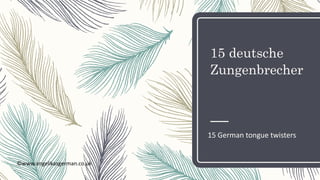
15 German Tongue Twisters - 15 deutsche Zungenbrecher
- 1. 15 deutsche Zungenbrecher 15 German tongue twisters ©www.angelikasgerman.co.uk
- 2. Wenn hinter Fliegen Fliegen fliegen, fliegen Fliegen Fliegen nach. When flies fly behind flies, then flies fly after flies.
- 3. Hinter Hanne Hermans Haus hängen hundert Hemden raus, hundert Hemden hängen raus, hinter Hanne Hermans Haus. Behind Hanne Herman’s house hundred shirts are hanging, hundred shirts are hanging behind Hanne Herman’s house.
- 4. In Ulm und um Ulm und um Ulm herum. In Ulm (town in Germany) and round Ulm and around Ulm.
- 5. Wir Wiener Waschweiber würden weiße Wäsche waschen, wenn wir wüssten, wo heißes Wasser wär. We Viennese laundry women would wash white laundry if we knew where we could find hot water.
- 6. Esel essen Nesseln nicht, Nesseln essen Esel nicht! Donkeys don't eat nettles, nettles don't eat donkeys.
- 7. Essig ess ich nicht. Ess ich Essig, ess ich Essig nur mit Kopfsalat. Vinegar I do not eat. If I eat vinegar, I eat vinegar only with lettuce.
- 8. Die Meisen aus Meißen sind ganz normale Meisen, nur eben aus Meißen. The tomtits from Meißen are just ordinary tits, but from Meißen.
- 9. Fischers Fritze fischt frische Fische. Frische Fische fischt Fischers Fritze. Fischer’s Fritz fishes for fresh fish. For fresh fish Fischer’s Fritz fishes.
- 10. The rattlesnakes rattled until their rattles began to sound exhausted. Es klapperten die Klapperschlangen, bis ihre Klappern schlapper klangen.
- 11. A wedding dress remains a wedding dress, and a red cabbage remains a red cabbage. Brautkleid bleibt Brautkleid, und Blaukraut bleibt Blaukraut.
- 12. Die Kirchhofer Stadtkirche hat ein kirschfarbenes Dach. The town church of Kirchhofen has a cherry coloured roof.
- 13. Der Flugplatzspatz nahm auf dem Flugplatz platz. The airport sparrow took a seat at the airport.
- 14. Ein tüchtiger Chirurg schließt tschechisch-chinesische Freundschaft. A hardworking surgeon makes friends with Czechs and Chinese
- 15. Zwischen zwei Zwetschgenzweigen zwitschern zwei Schwalben. Between two plum tree branches two swallows twitter.
- 16. Ein sehr schwer sehr schnell zu sprechender Spruch ist ein Schnellsprechspruch, auch ein nur schwer schnell zu sprechender Spruch heißt Schnellsprechspruch. A saying, which is very difficult to say very quickly is a ‘quick to say saying’ (really a made-up word), a saying, which is just difficult to say quickly is also a ‘quick to say saying’.
